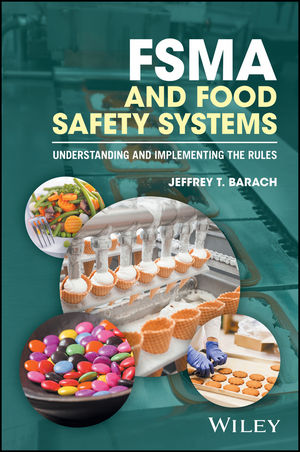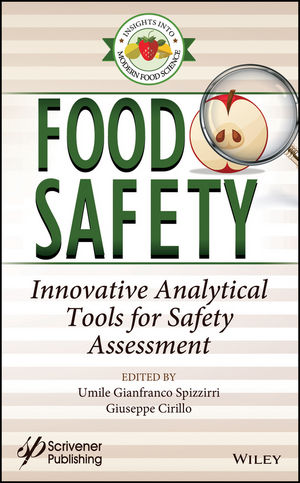Updated Food Safety Training, Solution for Upcoming FSMA Challenges, Part 2

In part one of this three-part series, we discussed the importance of integration technology applications in food safety training in accordance with the Food Safety Modernization Act (FSMA). There are a number, 24 in fact, of needed areas in food safety education according to the U.S. Food and Drug Administration (FDA) FSMA Preventive Controls for Human Foods operational program requirements. These areas range from personal hygiene to storage, cleaning, and sanitizing of processing equipment and utensils, among others, so the need for a thorough and documented training program has never been greater. In order to meet these objectives, a food facility must enlist experts in both training development as well as topical expertise in the design of a comprehensive and productive FSMA food safety training program.
Most of today’s food safety training programs continue to be traditionally formatted and lack the diversity needed to improve the quality of communication and overall effectiveness. In part two of our series, we will discuss best practice methods of delivery techniques for food safety education in accordance to the five levels of the already familiar (discussed in part I[1]) training matrix: entry, adoption, adaptation, infusion, and transformation, and levels of responsibility in a food facility and build on our understanding.
Effective Training Delivery Methods for FSMA
There are several well-respected and -recognized training delivery techniques. Three of my favorites are active, authentic, and constructive as they cover different levels of educational needs in a food facility. Through active training, employees are able to actively and efficiently participate in learning that is essential requirement for food safety training. Active learning strategies are generally more effective than traditional lecture to promote educational outcomes. One reason active training is such a popular strategy is that it puts learning into familiar constructs through explanation and facilitation. As we actively explain the purpose, course expectations, and activity expectations, we facilitate learning by encouraging demeanor, grading on participation, walking around the room, inviting questions, and so on.
Generally, each department includes new hires, and junior and senior level employees. FSMA specifies the requirement to deliver the same training objectives for all employees in the same department, though due to differing levels of expertise, the approach to each of these trainings is most effective when tailored to their level of knowledge. For example, junior-level and new employees will benefit greatly through the use of an authentic training mode, whereas senior-level employees may gain the most from the training developed with the constructive mode of learning. In the authentic mode of training, staff will receive their FSMA-related educational objective for the first time, so they need more detailed explanations about the educational objective. Those who thrive with a constructive style of learning generally are building on their previous education/experience and constructing additional learning based on that on previous information.
Now that we have a base-line knowledge of training modalities, let’s put the above explanations into practice by constructing a course curriculum and delivery method for one of the 24 FSMA-required training topics, personal hygiene, and describe how instructional delivery styles vary, depending on whether the active, authentic, or constructive strategies are incorporated. We will pick up our training delivery methods where we left off in part 1, with entry, adoption, adaptation, infusion, and transformation levels.
Before we continue, it is important to indicate that the educational objective and delivery techniques for employees within the same department may not be the same. In the below example, we are proposing fewer training hours and mandatory context coverage for constructive training (senior-level employees) versus authentic training (new hires and junior-level employees). This will make the productivity of training more valuable and improve employee self-confidence and application of the training requirements at a much more economical cost. Food manufacturing and corporate facilities may wish to involve an experienced consultant to design and develop proper FSMA related objectives based on the actual need and requirements of all personnel in a food facility.
Course: Personal Hygiene Constructive Learning (Entry): Total Learning Hours = 3
Course Description: This professional development course gives an overview of basics of personal hygiene and its effects on final product food safety and familiarizes staff with general personal hygiene practices as part of a food safety management system in accordance with FSMA requirements. The constructive learning method is concerned with the flexible use of technology to build knowledge in the modality that is most effective for junior-level staff.
Course Goals: This class aims to teach the basic principles of personal hygiene, so that by the end, staff will be able to utilize best personal hygiene practices to build on prior knowledge and construct meaning.
Target Audience: This course is designed for receiving, processing, storage, shipping, part time, retailers, and suppliers’ staff, dairy plant managers, and office staff who have been in similar courses and who require retraining, as defined by the company.
This course will include (but is not limited to) the following:
• 2 hours of major foodborne pathogens, impact mechanisms of foodborne pathogens, best practices of personal sanitation, and indirect paths of contamination
• 1 hour of importance of personal hygiene in food industries (monitoring, corrective action) and seasonal incentives for a better personal hygiene
Course: Personal Hygiene Authentic Learning (Entry Level or New Hires): Total Learning Hours = 7
Course Description: This professional development course gives an overview of basics of personal hygiene and its effects on final product food safety and familiarizes staff with general personal hygiene practices as part of a food safety management system in accordance with FSMA requirements. This authentic learning modality is concerned with the flexible use of technology to build knowledge in the modality that is most effective for each staff member.
Course Goals: This class aims to teach the basic principles of personal hygiene, enabling staff to utilize best personal hygiene practices to place learning into a meaningful personal hygiene context, increase personal hygiene relevance to the learner, and tap into staff’ intrinsic motivation.
Target Audience: This course is designed for receiving, processing, storage, shipping, part time, retailers, and suppliers’ staff, dairy plant managers, and office staff who have been in similar courses recently hired/will be hired, as defined by the company.
This course will include (but is not limited to):
• 2 hours of foodborne pathogens, impact mechanism of foodborne pathogens, best practices of personal sanitation, and forbidden behaviors in a food-handling environment
• 1 hour of importance of personal hygiene in food industries (monitoring, corrective action) and seasonal incentives for a better personal hygiene
• 4 hours of impacts of foodborne pathogens of disease, ways of entrance for foodborne pathogens and best practices to prevent the entrance of foodborne pathogens, washing hands, and indirect paths of contamination; hygienic behavior includes the wearing of clean protective clothing and avoiding activities such as eating near unprotected food products; become aware and familiar with last illness with diarrhea or vomiting, skin trouble anywhere on body, discharges from eye, ear, and mouth, digestion problems, and medical history regarding typhoid/paratyphoid fevers
Course: Personal Hygiene Constructive Learning (Adoptive and Adoptative): Total Learning Hours = 3
Course Description: This professional development course gives an overview of principals of personal hygiene and its effects on final product food safety and familiarizes staff with general personal hygiene practices as part of a food safety management system in accordance with FSMA requirements. This characteristic is concerned with the flexible use of technology to build knowledge in the modality that is most effective for each staff member.
Course Goals: This class aims to teach the basic principles of personal hygiene, enabling staff to utilize personal hygiene-learned concepts independently to grow conceptual skills and knowledge of allergens and skills needed to take the right corrective actions when necessary.
Target Audience: This course is designed for receiving, processing, storage, shipping, part time, retailers, and suppliers’ staff, dairy plant managers, and office staff who have been in similar courses and require retraining, as defined by the company.
This course will include (but is not limited to):
• 1 hour of concepts of Personal hygiene, prevalence of disease caused by the lack of personal hygiene
• 1 hour of personal hygiene in plant, importance of food borne related outbreaks on food recalls and food industries, forbidden behavior in a food-handling environment.
• 1 hour of courses for proper documentation (monitoring, corrective action) and weekly incentives for a better personal hygiene, concepts of direct and indirect routes of contamination.
Course: Personal Hygiene Authentic Learning (Adoptive and Adoptative): Total Learning Hours = 5
Course Description: This professional development course gives an overview of principals of personal hygiene and its effects on final product food safety and familiarizes staff with general personal hygiene practices as part of a food safety management system in accordance with FSMA requirements. This characteristic is concerned with the flexible use of technology to build knowledge in the modality that is most effective for each staff member.
Course Goals: This class aims to teach the basic principles of personal hygiene, enabling staff to utilize personal hygiene-learned concepts independently to grow conceptual skills needed to take the right corrective actions when necessary. Staff can explore the use of better personal hygiene practices as they build knowledge (such as labeling and identification of allergen areas, production tools, and equipment) to build on prior knowledge and construct meaning.
Target Audience: This course is designed for receiving, processing, storage, shipping, part time, retailers, and suppliers’ staff, dairy plant managers, and office staff who have been in similar courses recently hired/will be hired, as defined by the company.
This course will include (but not limited to):
• 1 hour of concepts of personal hygiene and prevalence of disease caused by the lack of personal hygiene
• 1 hour of personal hygiene in the plant and the importance of foodborne-related outbreaks on food recalls and food industries.
• 1 hour of courses for proper documentation (monitoring, corrective action) and weekly incentives for better personal hygiene and knowledge of concepts of direct and indirect routes of contamination
• 1 hour of plant- and personnel-driven contamination events due to poor personal hygiene; how to develop good operating practice procedures in personal hygiene and behaviors
Course: Personal Hygiene Constructive Learning (Infusion and transformation): Total Learning Hours = 3
Course Description: This professional development course gives an overview of personal hygiene and its effects on final product food safety and familiarizes staff with general and specific personal hygiene practice as part of a food safety management system in accordance with FSMA requirements. This characteristic is concerned with the flexible use of technology to build knowledge in the modality that is most effective for each staff member.
Course Goals: This class aims to involve staff on principles of personal hygiene, so that by the end, staff will be able to manage and suggest best personal hygiene practice to focus on the extent to place learning into a meaningful personal hygiene context, increase personal hygiene relevance to the learner, and tap into staff’ intrinsic motivation.
Target Audience: This course is designed for receiving, processing, storage, and shipping plant managers as well as staff who require retraining, as defined by the company.
This course will include (but is not limited to):
• 1 hour of management in personal hygiene, financial means, and developing clear guidelines and a personal hygiene prevention culture, focusing on permanent and random foodborne pathogens.
• 1 hour of foodborne pathogens in disease, importance of controlling foodborne pathogens by proper personal hygiene plans in a food plant, measures, authorities and responsibilities, development of a proper health surveillance and management procedures for food handling personnel
• 1 hour of proper documentation (monitoring, corrective actions)
Course: Personal Hygiene Authentic Learning (Infusion and transformation): Total Learning Hours = 5
Course Description: This professional development course gives an overview of personal hygiene and its effects on final product food safety and familiarizes staff with general and specific personal hygiene practice as part of a food safety management system in accordance with FSMA requirements. This characteristic is concerned with the flexible use of technology to build knowledge in the modality that is most effective for each staff member.
Course Goals: This class aims to involve staff on principles of personal hygiene, so that by the end, staff will be able to manage and suggest best personal hygiene practice to focuses on the extent to place learning into a meaningful personal hygiene context, increase personal hygiene relevance to the learner, and tap into staff’ intrinsic motivation.
Target Audience: This course is designed for receiving, processing, storage, and shipping plant managers and staff that are recently hired/will be hired, as defined by the company.
This course will include (but is not limited to):
• 1 hour of management in personal hygiene, financial means, developing clear guidelines and a personal hygiene prevention culture, focusing on permanent and random foodborne pathogens
• 1 hour of foodborne pathogens in disease, importance of controlling foodborne pathogens by proper personal hygiene plans in a food plant, measures, authorities and responsibilities, development of a proper health surveillance and management procedures for food-handling personnel
• 1 hour of proper documentation (monitoring, corrective actions)
• 2 hours of important foodborne pathogens that cause food recalls and best approaches to control these microorganisms; must include documented directives for a Good Manufacturing Practices program as well as a regular personal hygiene training program
In addition to the course curriculum development procedure, a more productive food safety training plan is required for all staff levels, areas of responsibility, and food processing environments. A table can provide staff-level educational requirements (core courses) vs. specific and/or possible needed requirements in specific facility (customized courses), using personal hygiene as a food safety training example. Receiving supervisors will need to have entry, adoption, and adaptation levels of training as a mandate. Another important point of training is the supplier/distributor training that could be adjusted, based on company needs, to have entry or higher levels of curriculum components.
Designing effective delivery techniques for food safety training programs to meet the intent of FDA’s FSMA requirements requires specialized design and in-depth understanding of staff levels, responsibilities, materials and content, and the facility environment. Training has become more than a narrative in a classroom setting, it is a dynamic learning environment where students and instructors work together for the betterment of a safer food supply. Whether choosing to take the steps to develop a comprehensive training program in-house or consulting with an outside expert who facilitates training programs for you, food safety implementation cannot be achieved without the requisite training nor will FDA recognize the safety of such programs without the demonstration of learned outcomes. FDA’s oversight and enforcement of FSMA requirements has begun. Make sure your facility’s training programs make the grade.
Mehrdad Tajkarimi, D.V.M., M.P.V.M., Ph.D., is an expert in national and international food safety regulations, warehouse and wholesale manufacturing, and the dairy, grain, poultry, and retail industries. He assists clients with organic requirements, FSMA, and natural food preservatives and packaging, foodborne pathogenic and spoilage microorganism characteristics, and shelf-life studies. He is an independent consultant to the EAS Consulting Group.
References
1. www.food-safety.com/enewsletter/updated-food-safety-training-solution-for-upcoming-fsma-challenges/.
Resources
1. www.slideshare.net/FAOoftheUN/personal-hygiene-in-food-production.
2. fcit.usf.edu/matrix/project/authentic-learning/.
3. Harris, KJ and AN Bonn. 2000. “Training Techniques and Tools: Evidence from the Foodservice Industry.” J Hosp Tour Res 24(3):320–335.
4. Omoregie M. 1997. “Distance Learning: An Effective Educational Delivery System.” Information Analysis 1070. ERIC, Documentation Reproduction Service No. ED 418 (683).
5. trainingtoday.blr.com/article/most-effective-training-techniques/.
Looking for a reprint of this article?
From high-res PDFs to custom plaques, order your copy today!








